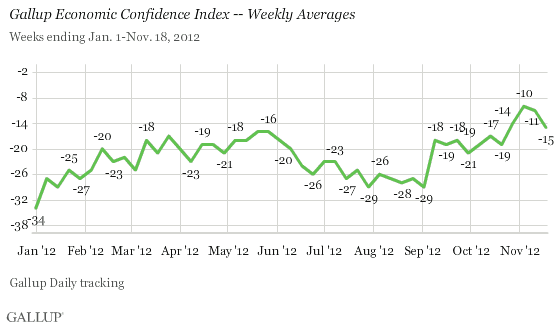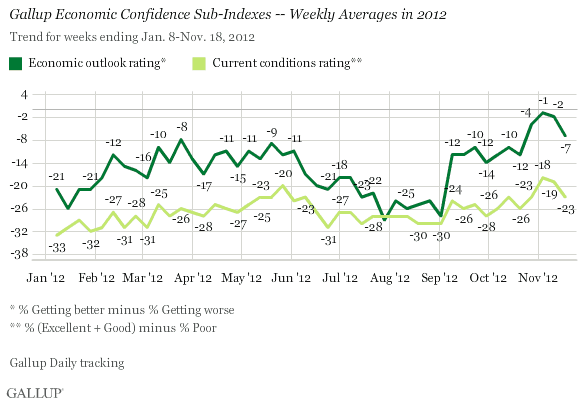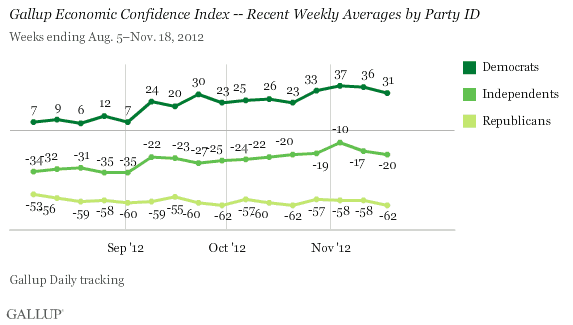WASHINGTON, D.C. -- Gallup's U.S. Economic Confidence Index dropped to -15 last week, from -11 the week prior. But, this is still one of the best readings of 2012.

The pullback in economic confidence resulted from a drop in both components of the index -- assessments of current economic conditions and of the nation's economic outlook. The -7 economic outlook rating is down from -2 the week before, with 44% of Americans saying the economy is getting better and 51% saying it is getting worse.
Sixteen percent of Americans say the economy is excellent or good, while 39% say it is poor, resulting in a -23 current conditions rating, down from -19 the week prior.

Economic Confidence Down Across Party Lines
Economic confidence declined among all political groups last week. Despite this uniform change, Democrats and Republicans remain sharply divided on their opinions of the economy, with Economic Confidence Index scores of 31 and -62, respectively.
Independents continue to be middle of the road, at -20. The gap between Democrats' and Republicans' evaluations of the economy grew as the Nov. 6 election approached, and at 93, the gap remains among the largest between the two parties Gallup has found, second only to the previous two weeks, which were at 94 and 95.

Bottom Line
Concerns about the looming "fiscal cliff" and a slumping stock market may be largely responsible for Americans' retreating economic confidence. If Congress and the president fail to reach a budget deal, substantial tax increases and spending cuts will automatically take effect in January, an outcome that economists warn could push the U.S. back into a recession.
Last week also saw an increase in unemployment claims, much of which was the result of jobs lost after Superstorm Sandy hit the east coast. Gallup also reported an increase in unemployment, echoing the government reports of fewer Americans finding work.
Although economic confidence in the U.S. in recent weeks has been at its highest since 2008, future improvement, including getting into positive territory anytime soon, likely hinges on the ability of Congress and the president to reach an agreement and avoid the fiscal cliff.
Gallup.com reports results from these indexes in daily, weekly, and monthly averages and in Gallup.com stories. Complete trend data are always available to view and export in the following charts:
Daily: Employment, Economic Confidence, Job Creation, Consumer Spending
Weekly: Employment, Economic Confidence, Job Creation, Consumer Spending
Read more about Gallup's economic measures.
View our economic release schedule.
Survey Methods
Results are based on telephone interviews conducted as part of the Gallup Daily tracking survey Nov. 5-11, 2012, with a random sample of 3,429 adults, aged 18 and older, living in all 50 U.S. states and the District of Columbia, selected using random-digit-dial sampling.
For results based on the total sample of national adults, one can say with 95% confidence that the maximum margin of sampling error is ±1 percentage point.
Interviews are conducted with respondents on landline telephones and cellular phones, with interviews conducted in Spanish for respondents who are primarily Spanish-speaking. Each sample includes a minimum quota of 400 cellphone respondents and 600 landline respondents per 1,000 national adults, with additional minimum quotas among landline respondents by region. Landline telephone numbers are chosen at random among listed telephone numbers. Cellphone numbers are selected using random-digit-dial methods. Landline respondents are chosen at random within each household on the basis of which member had the most recent birthday.
Samples are weighted by gender, age, race, Hispanic ethnicity, education, region, adults in the household, and phone status (cellphone only/landline only/both, cellphone mostly, and having an unlisted landline number). Demographic weighting targets are based on the March 2011 Current Population Survey figures for the aged 18 and older non-institutionalized population living in U.S. telephone households. All reported margins of sampling error include the computed design effects for weighting and sample design.
In addition to sampling error, question wording and practical difficulties in conducting surveys can introduce error or bias into the findings of public opinion polls.
For more details on Gallup's polling methodology, visit https://www.gallup.com/.
